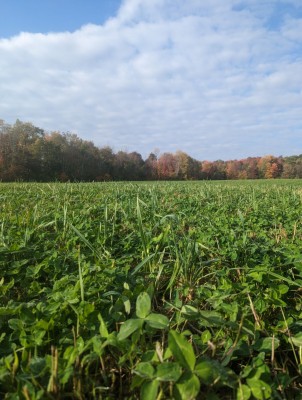Evaluating Your Pasture System
Katelyn Miller, Field Crops and Forage Specialist
Southwest New York Dairy, Livestock and Field Crops Program

Soil Properties:
Soil is the backbone of your pasture system. Creating a soil testing program is crucial to managing your soil inputs economically. Understanding your pH and nutrient levels is an important step towards productive pastures. In September, I wrote an article about soil sampling, so go check that out!
The ideal pH varies by species, and some may be different than you think. It's important to also think about if the species is a grass or legume. The rhizobia responsible for fixing nitrogen prefers a neutral pH, whereas grasses can tolerate a lower pH. Keep this in mind for maintaining proper pH.
When a pasture mix contains 30% legumes, your nitrogen needs are met. Your soil test results will help determine the right amount of phosphorus and potassium to apply. Additionally, the soil type and drainage of your pasture are important. For example, planting alfalfa in poorly drained soil is not recommended because of its long taproot.
Production:
A recovery period is the time that it takes a plant to regrow after grazing. Leaving adequate time between grazing will improve stand persistence and provide more forage. It is recommended to not graze below 3 inches as grazing too close will impact regrowth also. There are tools like grazing sticks and forage squares that can help calculate forage availability. Camila discussed using these tools in the August issue of Crops Cows and Critters.
Additionally, we must think about the seasonality of the species planted. Soil pH and nutrition may be the reason your species are not producing, but it could also be your production expectations. For example, cool season grasses produce lots of forage in May and October, but not in the heat of the summer. When selecting species, consider when they are going to produce the most. Consider mixing cool and warm season grasses and legumes to increase forage throughout the season.
Weed Pressure:
Controlling weeds is an important aspect of pasture management. Weeds in a field compete for light, nutrients, and water with your desired species. Additionally, their presence hurts both yield and forage quality. To control weeds though, they must be properly identified.
Properly identifying weeds helps to determine the right control method(s). Control can be based on many factors including the time of year and the growth cycle of the plant. Although the goal is to eradicate, controlling seed production can be a helpful strategy. Reducing the number of seeds in the seedbank will make control easier in years to come. Overall, your control options will depend on your production system and availability of inputs. The best weed control option is to combine a variety of control methods. This is known as integrated weed management. Rotating cultural, biological, mechanical, and chemical control will provide the best weed control. Relying on any one method is difficult and not recommended for control.
Evaluating Your Pasture System (jpg; 324KB)
Upcoming Events
Boots in the Barn: Cornell Dairy Research Updates
January 13, 2026
January 20, 2026
January 27, 2026
February 3, 2026
February 10, 2026
February 17, 2026
February 24, 2026
Join us for some or all!
Webinar: Converting Old Dairy Barns into swine Facilities
January 21, 2026 : Webinar: Converting Old Dairy Barns into swine Facilities
Tim Terry, Farm Strategic Planning Specialist with Cornell's Pro-Dairy program will share information on what it takes to transition an old dairy barn for swine production. We plan to cover flooring, ventilation, and lighting, considerations for system workability, and more! Registration is free.
Southern Tier Crop Congress
January 28, 2026 : Southern Tier Crop Congress
Belfast, NY
Join SWNYDLFC and CCE Allegany County for the upcoming Southern Tier Crop Congress. CCA and DEC credits are available!
Announcements
Cows, Crops & Critters Newsletter Sponsorship
TRYING TO REACH GROWERS AND AGRIBUSINESSES IN OUR SOUTHWEST REGION OF NEW YORK?Weekly Email Update: Shared with 625+ households who have signed up with our program.
Monthly Paper Mailer: To reach our stakeholders and farmers who lack internet access, we send out a monthly mailer where your company's logo and contact information would be featured with a mailing list of 330+ households.
If you sponsor our weekly and monthly publications you reach approximately 955 households.





